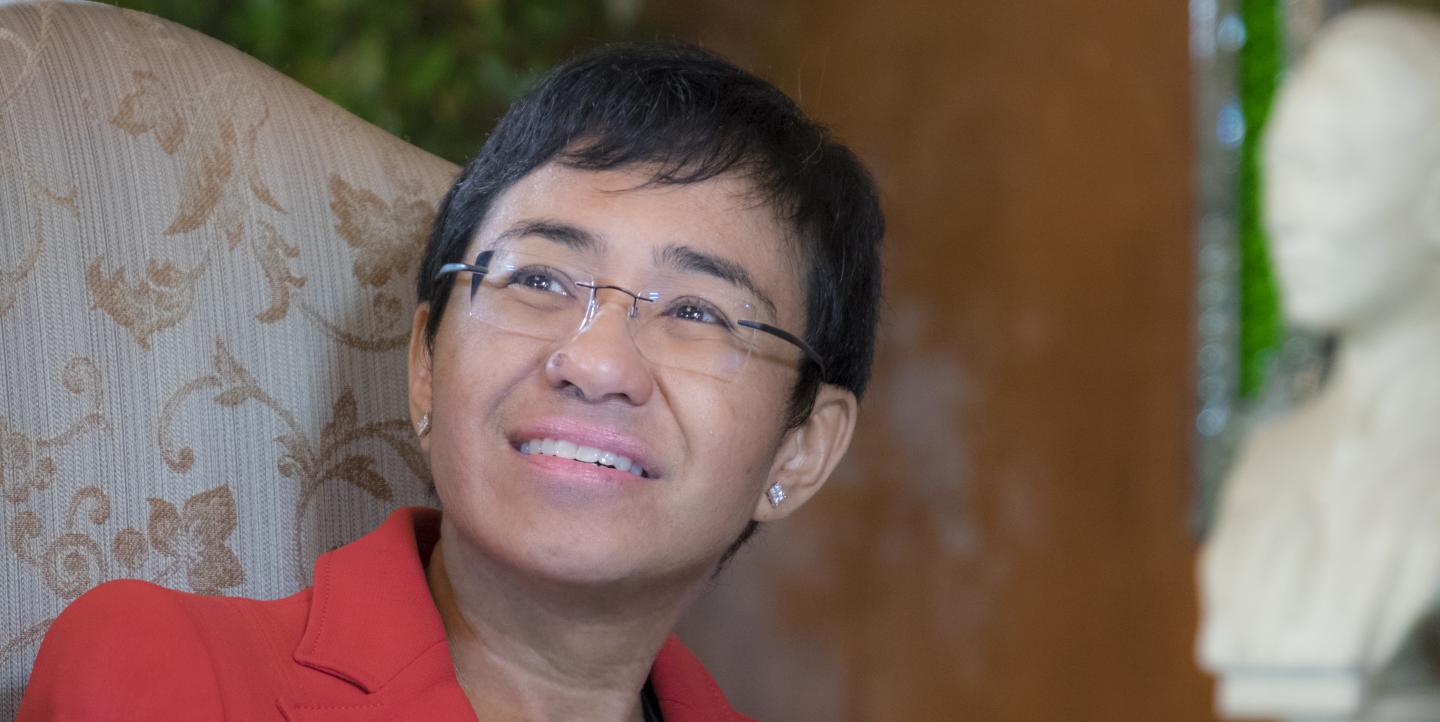Filipino-American journalist Maria Ressa faces new criminal charges for cyber libel — this time over a tweeted screenshot of an article published almost 20 years ago. This latest charge, condemned yet again by press freedom, civil society and journalism organizations around the world, comes less than six months after Ressa and her colleague Reynaldo Santos, Jr. were found guilty of criminal cyber libel over a typo in a 2012 article.
Ressa was sentenced to up to six years in prison on the original criminal cyber libel conviction. This second related charge could more than double the sentence, her lawyers say.
In the past two years, Ressa has been arrested twice and convicted once on a trumped up criminal charge. She has paid more than US$80,000 in bail already, and could spend the rest of her life in jail if she’s convicted in the eight cases she continues to fight in the Philippines.
International human rights defenders describe Ressa’s battles as emblematic. And Ressa warns: She, her news organization Rappler, and her country were the proverbial canary in the coal mine — a trial run for how a country can dismantle independent journalism. The crackdown on the celebrated journalist — and how it’s being carried out — are now being exported across the globe, Ressa says.
“They test the tactics of how to manipulate America in our country. If it works, they port it over to the rest of the world,” Ressa says in the trailer for A Thousand Cuts, a recently released documentary about her struggle to “hold the line” against viral disinformation and state-orchestrated attacks targeting independent journalism in the Philippines.
[Read more: Decoding Filipino-American journalist Maria Ressa's complicated legal battles]
Press freedom in the Philippines
The Philippines had been a beacon of democracy in Asia. The country’s rapid fall into authoritarianism underscores the need to treat the assault on independent journalism there as a wake-up call for the rest of the world.
“The targeting of Maria Ressa — and Rappler — sets an alarming precedent for press freedom, not only in the Philippines but around the world,” Rachel Chhoa-Howard, a researcher on Malaysia, Philippines, Singapore and Brunei at Amnesty International, told IJNet. “Populist governments could see this as an opportunity to come up with their own politically motivated charges to go after media critics and others, simply for the peaceful exercise of their right to freedom of expression.”
In the Philippines, and increasingly in other countries, a primary tactic against independent journalists is the weaponization of social media.
Facebook enabled armies of online trolls supporting Philippines President Rodrigo Duterte to manipulate public opinion in the run-up to the country’s 2016 presidential election that brought him to power. In the years since, Duterte has leveraged misinformation on social media to help chip away at Ressa and Rappler’s freedom.
Attackers have used online threats to intimidate Ressa and tarnish her credibility. At one point, she was receiving an average of 90 hate messages per hour. Online assailants have dehumanized Ressa and called for her to be arrested, raped and killed. The attacks have had a chilling effect on other reporters, too. Journalists who might otherwise counter the pro-Duterte narrative choose instead to self-censor.
After the Philippine government weaponized social media, it began to do the same to the law. In this ripe environment, the Duterte administration forced the closure of the country’s largest broadcast company, ABS-CBN, and compelled the owners of the country’s largest daily newspaper, The Philippine Daily Inquirer, to announce they would sell the paper before abandoning the sale. Meanwhile, the Duterte administration has brought 12 cases against Ressa and Rappler since 2017, including at least eight that remain active today.
[Read more: Maria Ressa of Rappler warns of threats to independent journalism in the Philippines]
Press freedom’s global backslide
Ressa’s legal battles may be the most high profile press freedom issue today, but they’re far from isolated. The challenges she continues to face offer insight into how the suppression of independent journalism may play out — or already is — elsewhere in the world.
In Russia, investigative reporter Ivan Golunov was arrested in June 2019 on fabricated drug trafficking charges, and dozens of journalists were detained in July for peacefully protesting authorities’ crackdown on their colleagues. Two Reuters journalists in Myanmar, Wa Lone and Kyaw Soe Oo, were sentenced in 2018 to seven years in prison each in response to their investigation into the murders of 10 Rohingya Muslim men and boys.
The rise of Hindu nationalism in India has exacerbated attacks on social media against journalists, while some have also been arrested. Dhaval Patel, editor of the news site Face of Nation, was detained in May and charged with sedition for his reporting on a possible leadership change in the northwestern state of Gujarat. In April, journalist Gautam Navlakha was arrested for his reporting and work as a human rights activist. Independent journalism has come under heavy attack in Kashmir, in particular, where the Indian government shut down the internet for months after revoking the region’s autonomy.
In Vietnam, the ruling Communist Party has all but eliminated a free press, save for a handful of bloggers and independent journalists. The country has increased its persecution of these independent voices in recent years. In May, authorities arrested journalists Nguyen Tuong Thuy and Pham Chi Thanh for “opposing the state,” reported CPJ. In March, Radio Free Asia blogger Truong Duy Nhat was sentenced to ten years in prison after he was kidnapped while seeking asylum in Thailand and brought back to Vietnam.
In the U.S., long regarded as a standard bearer for press freedom, death threats and violence against reporters increased during the Trump administration. In 2018, a gunman killed five journalists working at the Capital Gazette in Annapolis, and later that year, CNN evacuated its New York offices after receiving a bomb threat. Just this past summer, press freedom organizations documented more than 800 attacks on journalists during the Black Lives Matter protests.
These examples barely skim the surface of press freedom violations in recent years. The Press Freedom Index warns of an “increasingly complex and hostile” environment for journalists in Latin America, for example, and the Middle East is home to the highest number of journalists’ deaths. In Europe, journalists face more threats today as rule of law weakens, murder with impunity is on the rise and financial issues facing the news industry increase.
The role of Big Tech
As press freedom backslides, so too does democracy. Authoritarian governments and democracies alike have used disinformation on social media to accomplish antidemocratic aims. Meanwhile, Big Tech — and Facebook, especially — hide behind arguments of free speech as they give a green light to misinformation, hate speech and provocations of violence on their platforms, Ressa and other critics say.
Similar to the Philippines, state-orchestrated troll armies are also at work in Russia, India and Vietnam, the 2020 Reporters without Borders’ Press Freedom Index warns.
In Myanmar, a U.N. fact-finding mission determined that Facebook played a critical role in the genocide of Rohingya Muslims. Hate speech, propaganda and incitements of violence spread on the social media platform, the report found. While Facebook took steps to clamp down on minority rebel voices, it left pro-military social media activity untouched.
After disinformation campaigns on Facebook influenced the 2016 election results in the U.S., President Donald Trump has continued to peddle misinformation and incite violence online — all eagerly received by his millions of followers. He has accompanied this with public attacks on journalists and news outlets.
Ressa and others have called on Big Tech companies to better regulate the spread of false and harmful information on their platforms. On Facebook in particular, they say, misinformation and hate speech proliferate unchecked. In fact, Ressa has explicitly accused Facebook of being partially responsible for her predicament. Before she was convicted, she told the company: "If you don't change what you're doing, I could go to jail."
Facebook has experimented with labeling misinformation and disinformation in 2020, especially around the U.S. presidential election and COVID-19. They’ve done so, however, to a lesser degree than Twitter and with minimal effectiveness. Even in the face of an advertiser boycott over the summer, the social media giant proved reluctant to take meaningful steps to address its issues of misinformation and hate speech, critics say. This is especially consequential in the Philippines, where Facebook is the “only way to access the internet for most Filipinos,” Buzzfeed’s Davey Alba explained in a 2018 article.
As Facebook has supplanted journalists’ power to distribute news, its lack of regulation offers prime opportunity for leaders like Duterte to take advantage, to flood their citizens with lies and misinformation that further anti-democratic agendas, Ressa and others say. In the Philippines, Rappler and other sources of independent journalism as a whole have already suffered.
“Our role as gatekeepers, we’ve lost that. We no longer distribute the news. The largest distributor of news globally is Facebook, the social media platforms — and the tech platforms have abdicated responsibility for protecting the public’s fear,” said Ressa in an ICFJ-Frontline webinar in June. “If we don’t fix that, then every country will have to deal with the fact that lies spread faster than facts, and lies laced with anger and hate, repeated a million times, become fact.”
Think of it like the movie “Inception,” Ressa suggested. Much like “extractors” can go into the dream world to change the real world — that’s what happens on social media.
Said Ressa, “If you can make people believe lies are the facts, you can control them.”
David Maas is the manager of IJNet.
Main image supplied by Rappler.


